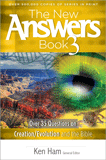Free Indeed
Last Word
At secular universities, students are challenged to question everything, to seek new ways of looking at the world. But they aren’t told what to do if they find the truth. That changes everything.
“Ye shall know the truth and the truth shall make you free.” This quotation has a special place in my life. It was inscribed on the outer wall of Bond Chapel at the University of Chicago, where I attended school and was converted to Christ thirty years ago.
This issue of Answers magazine—more than any other—has reawakened old memories about those heady college days, when I walked on campus as a proud young man, hoping to find my way in the world and make my mark.
U of C has a reputation for challenging students to question everything, to find new ways of looking at the world, to dig for truth in ways that nobody else has considered before.
How ironic that a U of C student should now be editing a magazine on building a biblical worldview. That’s not really what my professors had in mind.
The explanation is the power of truth to set a person free.
Most of my former classmates are still studying, puzzling over the mysteries of life and human existence, testing one theory against the next, always learning but never quite coming to the knowledge of the truth.
“If you abide in My word, you are My disciples indeed. And you shall know the truth, and the truth shall make you free.”
The difference between them and me is found in the fuller quotation from Christ: “If you abide in My word, you are My disciples indeed. And you shall know the truth, and the truth shall make you free” (John 8:31–32).
God warns that any effort to find the truth without turning to the light of His Word will prove fruitless. When the blind leads the blind, both will fall into the ditch.
At school we studied Plato, Aristotle, Wittgenstein, and many other great philosophers. But my professors never told us what to do if we actually found the truth.
Learning that Jesus Christ is both Creator and Savior changed everything for me. When I repented, not only were my sins forgiven, but my whole perspective on life changed. By God’s grace old things passed away; all things became new (2 Corinthians 5:17).
The method for seeking knowledge must change when you find the truth. Like the noble-minded Bereans, believers must humbly test man’s theories against God’s Word, “searching the Scriptures daily to find out whether these things [are] so” (Acts 17:11).
Like my former classmates, I still relish better understanding. I love science and new discoveries. The difference is that I now have an absolute standard by which all ideas are judged.
While working with the magazine team to prepare this issue, I had the pleasure of reexamining some scientific discoveries that had intrigued me as a young man, such as the mysterious creatures of Madagascar and the bizarre tube worms in deep-sea vents.
I was reminded just how much God’s Word has changed my heart and mind over the past three decades.
It’s an exciting time to be alive. The proliferation of technology has produced more amazing data about the world than ever before. Creationists are striving to understand this data from a perspective nobody else is considering. They’re helping expose the true history of the world, which is far more wonderful and inspiring than any work of fiction.
When God’s Son makes us free, we are free indeed. Our life takes on a whole new purpose—to know and love Christ, who is the Way, the Truth, and the Life.
That’s the freedom—and joy—that comes from being His disciple.
Answers Magazine
July – September 2010
From subtropical Madagascar to Antarctica, from frozen deserts to poisonous submarine volcanoes, creatures seem to inhabit every corner of the globe. How can they survive so well under so many different conditions? This issue includes a special section that examines life at the extremes, where God’s creative power continues to astound and delight us!
Browse Issue SubscribeRecommended Resources

Answers in Genesis is an apologetics ministry, dedicated to helping Christians defend their faith and proclaim the good news of Jesus Christ.
- Customer Service 800.778.3390
- © 2024 Answers in Genesis





